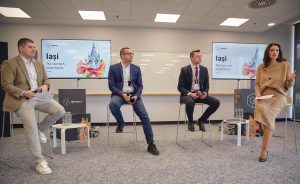EY: Artificial Intelligence in Professional Services: Friend or Foe?

Author: Alex Milcev, Partner, leader of the Fiscal and Legal Assistance department, EY Romania
A simple Google search for the initials AI (Artificial Intelligence) turns up 12.2 billion results in just 0.35 seconds, which may be an indication, if not the most relevant, of the scope of the phenomenon, just one year after the emergence of the first AI solution. With the passage of time and more frequent access for different searches, topics and concrete content solutions, user adoption has grown exponentially.
Basically, the most important search engines have launched their own artificial intelligence applications, and so have the world’s big companies, who have allowed and allocated significant funds to create their own AI solutions. The latest Gartner study, published at the end of 2023, reveals that 55% of global organizations are in the phase of testing or even exploiting Generative Artificial Intelligence and have opted for increased investments in this segment.
Another study on the state of AI-based solutions globally in 2022 alone shows that the volume of spending on the creation of mass and customized artificial intelligence programs will reach USD 64 billion in 2025, at an annual rate of 18% (Global AI Software Forecast, 2022 | Forrester).
Under these conditions, the question regarding the future in this context arose absolutely naturally: where, in general, in the area of professional services such as taxation and consulting? To what extent will humans be replaced by artificial intelligence and what are the areas where robots will cause the reduction of human labor?
Obviously, the area of tax consulting is no less troubled by this question, because sooner or later, here too, artificial intelligence solutions will become part of the daily routine. Of course, on different levels of work and in different proportions of use, it is likely that a total replacement of the human tax consultant, if we only take this example, will not happen soon.
It is important to understand, in the wave of diverse and divergent opinions, what is the use of artificial intelligence and how it could be seen as an ally rather than an enemy or competitor. It is already very clear that AI has a wide range of applicability and can bring multiple benefits, in the sense of streamlining processes, reducing the time allocated to certain tasks, reducing human errors (especially in routine processes), even on the analysis and interpretation side of the data.
I would appreciate here that practically no effort can be considered too great in analyzing the opportunity to invest and adopt AI solutions, precisely in order to make an informed decision regarding their applicability within a company or in a particular field, such as tax and business consulting. As for tax consulting professionals, now is the best time to call and redouble their efforts with AI solutions, which could relieve them of the “boring” part of the profession and give them valuable time for analysis and identifying the best fiscal and business options for their clients.
They could have at hand, in addition to their knowledge, analytical skills and experience, essential in such a complex field as that of taxation, a tool that can open perspectives totally unsuspected until now. An in-house AI solution will significantly increase efficiency and results as businesses and people become familiar with this new technology. In the area of tax consultancy, two things are certain: the huge volume of data that those working in the field have to analyze and process plus the tasks/operations to be carried out day by day and month by month, repetitive, input as if in the DNA of “tax workers”.
Artificial intelligence is already being used to automate a number of these routine tax operations that make up the daily workload of today’s tax professionals. Of course, there will be a next level to the whole story, which could go as far as automatically checking invoices (thousands, tens of thousands) to see if corporate tax expenses are allowable, for example, or analyzing spreadsheets for track and correctly allocate expenses to different positions and funds.
It is beyond any doubt that we are talking about the constant increase in the efficiency of consulting work, in a profession whose role and level of complexity, on the contrary, will increase and in no way decrease with the adoption of AI solutions. We are talking about a much more complicated tax and taxation framework both globally and in Romania, where tax consultants will have to carry out new reporting and analysis activities, in addition to their current responsibilities. It is precisely here that we can observe the exceptional role that can be attributed to AI solutions.
Transferring repetitive and mundane tasks to AI-type solutions, either developed in-house by the company (the costs are quite high at the moment), or to adopt and adapt an already created solution, will free up time for tax professionals so that they will be able to focus on creating strategies and solutions for customers with high added value.















